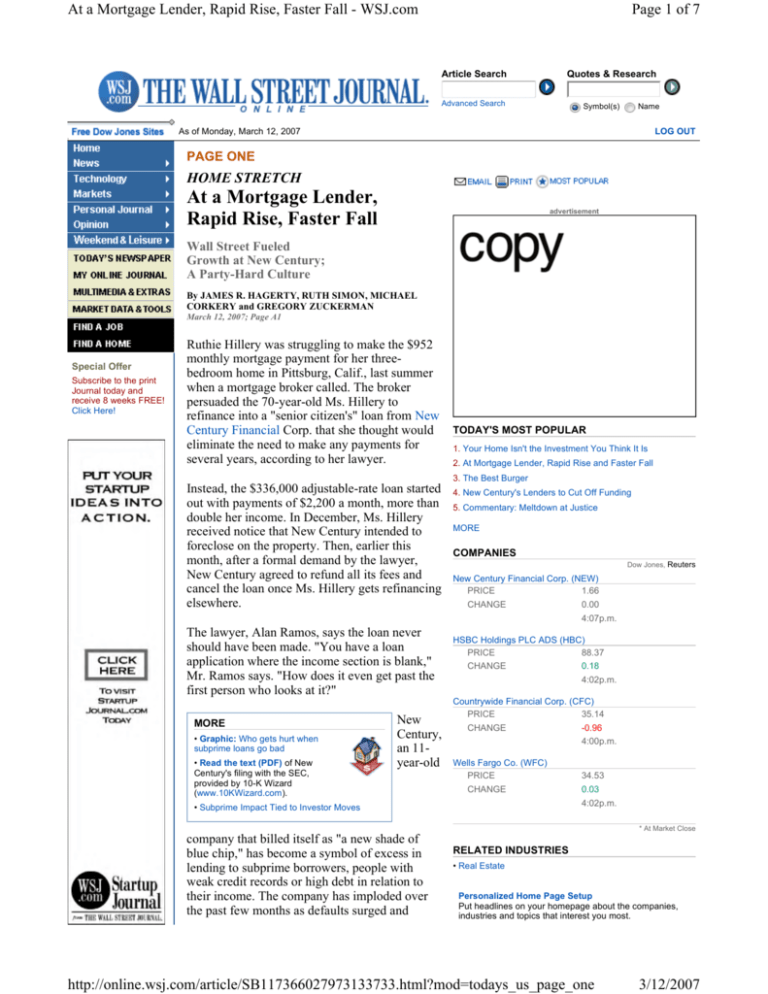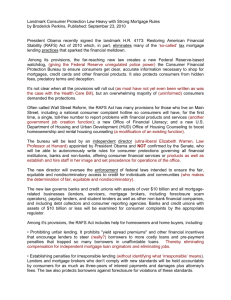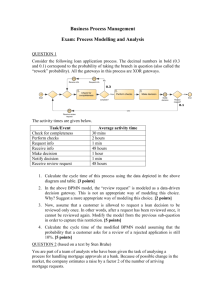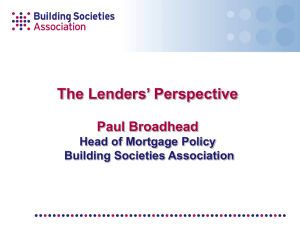
At a Mortgage Lender, Rapid Rise, Faster Fall - WSJ.com
Page 1 of 7
Article Search
Quotes & Research
Advanced Search
Symbol(s)
Name
As of Monday, March 12, 2007
LOG OUT
PAGE ONE
HOME STRETCH
At a Mortgage Lender,
Rapid Rise, Faster Fall
advertisement
Wall Street Fueled
Growth at New Century;
A Party-Hard Culture
By JAMES R. HAGERTY, RUTH SIMON, MICHAEL
CORKERY and GREGORY ZUCKERMAN
March 12, 2007; Page A1
Special Offer
Subscribe to the print
Journal today and
receive 8 weeks FREE!
Click Here!
Ruthie Hillery was struggling to make the $952
monthly mortgage payment for her threebedroom home in Pittsburg, Calif., last summer
when a mortgage broker called. The broker
persuaded the 70-year-old Ms. Hillery to
refinance into a "senior citizen's" loan from New
Century Financial Corp. that she thought would
eliminate the need to make any payments for
several years, according to her lawyer.
TODAY'S MOST POPULAR
1. Your Home Isn't the Investment You Think It Is
2. At Mortgage Lender, Rapid Rise and Faster Fall
3. The Best Burger
Instead, the $336,000 adjustable-rate loan started 4. New Century's Lenders to Cut Off Funding
out with payments of $2,200 a month, more than 5. Commentary: Meltdown at Justice
double her income. In December, Ms. Hillery
MORE
received notice that New Century intended to
foreclose on the property. Then, earlier this
COMPANIES
month, after a formal demand by the lawyer,
Dow Jones, Reuters
New Century agreed to refund all its fees and
New Century Financial Corp. (NEW)
cancel the loan once Ms. Hillery gets refinancing
PRICE
1.66
elsewhere.
CHANGE
0.00
4:07p.m.
The lawyer, Alan Ramos, says the loan never
should have been made. "You have a loan
application where the income section is blank,"
Mr. Ramos says. "How does it even get past the
first person who looks at it?"
MORE
• Graphic: Who gets hurt when
subprime loans go bad
• Read the text (PDF) of New
Century's filing with the SEC,
provided by 10-K Wizard
(www.10KWizard.com).
New
Century,
an 11year-old
HSBC Holdings PLC ADS (HBC)
PRICE
88.37
CHANGE
0.18
4:02p.m.
Countrywide Financial Corp. (CFC)
PRICE
35.14
CHANGE
-0.96
4:00p.m.
Wells Fargo Co. (WFC)
PRICE
CHANGE
34.53
0.03
4:02p.m.
• Subprime Impact Tied to Investor Moves
* At Market Close
company that billed itself as "a new shade of
blue chip," has become a symbol of excess in
lending to subprime borrowers, people with
weak credit records or high debt in relation to
their income. The company has imploded over
the past few months as defaults surged and
RELATED INDUSTRIES
• Real Estate
Personalized Home Page Setup
Put headlines on your homepage about the companies,
industries and topics that interest you most.
http://online.wsj.com/article/SB117366027973133733.html?mod=todays_us_page_one
3/12/2007
At a Mortgage Lender, Rapid Rise, Faster Fall - WSJ.com
Page 2 of 7
accounting misdeeds surfaced. New Century's
share price last week dropped 78% to $3.21 as some traders bet a bankruptcy-court filing is near.
New Century's swift rise and fall illuminates how Wall Street investment banks such as Morgan
Stanley and hedge funds awash in cash helped fuel a binge in subprime lending that prolonged the
housing boom. The lenders made themselves vulnerable by relying heavily on outside mortgage
brokers and gunning for growth even as the boom faded. The Wall Street banks supplied the
money to keep them on a roll, readily gobbling up loans and turning them into securities that
global investors were avid to put into their portfolios.
With a work-hard, party-hard culture, New Century took its employees on a boozy cruise to the
Bahamas and threw one bash in a train station in Barcelona, Spain, former employees say. Within
a few years, the company, whose head offices are in a black-glass tower in Irvine, Calif., became
one of the nation's top subprime lenders, jostling with older rivals like HSBC Holdings PLC and
Countrywide Financial Corp.
Last week, New Century announced that it had stopped making loans because too many creditors
had cut off funding. The company expects to report a loss for 2006 but can't yet quantify it. It is
facing a federal criminal investigation of its accounting and trading in its stock before a negative
announcement in February.
A New Century spokeswoman declined to comment on Ms. Hillery's case or any other aspects of
the company's business.
While companies like New Century are free to lend through branch offices, Web sites or call
centers, their main way of reaching customers has been via independent mortgage-brokerage
firms, generally tiny local outfits. Mortgage brokers find customers, advise them on which types
of loans are available and collect fees for handling the initial processing. There are more than
50,000 mortgage-brokerage firms and they are involved in 60% of all home loans, up from 40% a
decade ago, says Tom LaMalfa, managing director of Wholesale Access, a mortgage research
firm in Columbia, Md.
New Century and its rivals competed fiercely for business
from brokers, who often favor lenders able to make loans
quickly. John Waite, a mortgage broker in Appleton, Wis.,
says he liked working with New Century because it was
"very easy." Until recently, he says, New Century rarely
demanded reviews of the appraisals on which loans are
based.
Thanks to the brokers, New Century ramped up its business
quickly without having to hire a lot of employees or find
office space. Brokers "work out of homes and cars and little
offices," Mr. LaMalfa says, and they're often willing to go to
customers' homes in the evening or on the weekend.
But by outsourcing much of its direct contact with
consumers, New Century and other lenders also lost some
control over the screening of borrowers and the presenting of loan choices. Some lenders and
industry consultants say subprime lenders' dependence on brokers partly explains the
industrywide surge in mortgage fraud. In a typical fraud, lenders are duped into making loans
based on inflated home appraisals or income data. Some schemes involve organized rings that
take the money and run without ever making a loan payment.
Fraud appears to be one reason for a recent rash of defaults occurring within the first few months
of subprime loans. One hint that fraud might be a problem at New Century came in the company's
disclosure last week that in December, borrowers failed to make even the first payment on 2.5%
of New Century's loans. Normally people who borrow in good faith manage to make at least the
first few payments.
http://online.wsj.com/article/SB117366027973133733.html?mod=todays_us_page_one
3/12/2007
At a Mortgage Lender, Rapid Rise, Faster Fall - WSJ.com
Page 3 of 7
Lenders loosened standards considerably in the first half of this decade. Home prices were
climbing so fast that borrowers who couldn't keep up on payments could almost always sell their
homes for a profit or refinance into a loan with easier terms. That emboldened lenders to offer
loans with little or no down payment. Sometimes they let borrowers skip burdensome paperwork
such as digging out tax forms to prove how much money they made.
Subprime lenders took cues from Wall Street. Investment banks and hedge funds were ravenous
for the riskiest types of loans, whose higher yields made them vital ingredients in investment
packages offered to investors globally. New subprime loans made in 2006 totaled about $605
billion, or about 20% of the total mortgage market, up from $120 billion, or 5%, in 2001,
according to Inside Mortgage Finance, an industry newsletter.
Wall Street is deeply entrenched in the entire mortgage market, including loans to more
creditworthy borrowers, on which defaults so far have remained low. Last year, banks and
brokerage firms pocketed $2.6 billion in fees from underwriting bonds that use mortgages as their
collateral, nearly double 2001's figure. Wall Street banks also extended billions of dollars of
short-term credit, called warehouse lines, that allowed lenders like New Century to fund mortgage
loans. (See related article.)
New Century, whose loan originations jumped to $59.8 billion in 2006 from $6.3 billion five
years before, proved an especially valuable client. It has spent about $38 million in fees just for
stock and bond sales since 1998. The company is structured as a real-estate investment trust and,
under rules governing REITs, must pay out the vast majority of its earnings as dividends. That
meant it needed to return frequently to Wall Street to raise money and keep its operations going.
Morgan Stanley has
helped underwrite
$9.8 billion of stock
and bonds for New
Century since 1998,
pocketing about
$17.4 million in fees,
according to datatracker Thomson
Financial. Last week,
Morgan Stanley
helped New Century
with an emergency
loan even as other
Wall Street banks
said no. Morgan
Stanley declined to
comment.
Wall Street firms
such as Morgan
Stanley and Bear
Stearns also compete
with subprime
lenders by offering
their own mortgage
loans via brokers. On
an online forum for
mortgage brokers
last week,
Christopher Logan,
an account executive
for Morgan Stanley's recently acquired Saxon Mortgage subprime-lending arm, said his company
is still eager to lend as others bow out. "With Morgan Stanley as our parent, we have the stability
http://online.wsj.com/article/SB117366027973133733.html?mod=todays_us_page_one
3/12/2007
At a Mortgage Lender, Rapid Rise, Faster Fall - WSJ.com
Page 4 of 7
& strength -- which is what it takes to survive in today's subprime!" Mr. Logan wrote.
The shakeout in the subprime area is the latest of the mortgage industry's periodic purges of
dubious practices and weak lenders. In the mid- to late-1980s, savings-and-loan institutions
moved into risky lending, sometimes to cover losses after interest rates turned against them.
Courts found that some executives looted dying S&Ls. A 1989 government bailout ultimately
cost hundreds of billions of dollars.
The collapse of many S&Ls, once the dominant force in home mortgages, opened the way for
specialist mortgage-banking firms and commercial banks to take more of the business. Today,
Countrywide and Wells Fargo & Co. have a combined share of around 30% of all home loans
originated each year, but the rest of the market is splintered among more than 8,000 lenders.
Regulation is a patchwork. Five federal agencies oversee mortgage lenders affiliated with banks,
thrifts or credit unions, while New Century and others that don't take deposits are regulated by
state agencies.
New Century's founders -- Edward Gotschall, Brad Morrice and Robert K. Cole -- worked
together at a California mortgage lender in the early 1990s and formed New Century in 1995 with
about $3 million of venture capital. It went public in 1997 and survived a scare the next year
when Russian loan defaults caused investors to flee risky businesses and some subprime lenders
went out of business. U.S. Bancorp of Minneapolis helped out by acquiring $20 million in New
Century preferred stock.
At the height of the housing boom in 2003 and 2004, New Century executives grumbled that the
stock market was undervaluing their company. They and several other subprime lenders
responded by turning their companies into REITs, hoping to attract investors interested in high
dividends. The move didn't have much of an effect, as investors continued to worry that earnings
and dividends in the mortgage industry couldn't be sustained at boom levels. The REIT structure
also made it harder for New Century to put aside earnings for a rainy day.
Despite disappointment over the share price, former New Century employees say the company
was a fun and rewarding place to work. One former executive says the company made a priority
of promoting from within. A former secretary to Mr. Cole took charge of investor relations.
Partying and heavy drinking were common on company outings, former employees say. David
Pace, a former New Century account executive who dealt with loans in southeast Michigan, says
the theme of one cruise in the Bahamas was "The Best Damn Mortgage Company. Period."
The company also sent top-producing employees to a Porsche-driving school, says James Fuller,
a former project manager in New Century's information-technology department. "It was a culture
of excess,'' says Mr. Fuller, who left in 2005.
Racing is a passion for one former top executive, Patrick J. Flanagan. While he was at New
Century, a division under his control sponsored a Nascar race car. In late 2005, the company
granted Mr. Flanagan a six-month leave of absence with pay of $76,445 a month (he had made
nearly $4 million the year before), while he looked for new horizons. He then left the company
and says he has spent part of his time competing in car races. He declined to comment on New
Century.
Company executives made a splash with charitable giving. Mr. Flanagan last year pledged
$500,000 to a private school attended by four of his children in Aliso Viejo, Calif. Co-founder
Mr. Gotschall and his wife, Susan, gave $3 million to a hospital in Mission Viejo, Calif. In the
2006 election cycle, New Century's political action committee contributed $202,634 to political
campaigns, according to the Center for Responsive Politics.
Some analysts warned of trouble long before this month. An August 2005 report from Gradient
Analytics Inc., a research firm in Scottsdale, Ariz., highlighted heavy selling of shares by the
company's three founders as a sign that prospects for the company were clouding.
http://online.wsj.com/article/SB117366027973133733.html?mod=todays_us_page_one
3/12/2007
At a Mortgage Lender, Rapid Rise, Faster Fall - WSJ.com
Page 5 of 7
In November 2006, the Center for Financial Research and Analysis, an accounting research firm
in Rockville, Md., flagged concerns about New Century's third-quarter earnings release. CFRA
analyst Zach Gast noted that the company for the first time had lumped together two categories of
reserves, one for losses on defaulted loans and a second for losses on real estate that had been
acquired through foreclosure. Combining those two categories allowed the company to show a
small increase in reserves from a quarter earlier, he wrote. But that masked a decline of 8.7% in
the reserve for losses on soured loans, to $191.6 million, he calculated.
Mr. Gast found it curious that New Century was lowering reserves at a time when defaults on
subprime loans generally were surging. Had New Century maintained reserves at levels
comparable with the second quarter, he estimated, earnings per share would have been at least
50% lower than the $1.12 reported.
At an investor conference on Nov. 28, New Century's co-founder and chief executive, Mr.
Morrice, said that despite the subprime area's problems, New Century was "well-positioned to
compete and continue to profitably grow market share." Patti Dodge, an executive vice president,
added that the company would continue to enjoy adequate liquidity thanks to "strong
relationships with...Wall Street lenders."
In fact, when the chips were down last week, some of those Wall Street firms refused to extend
New Century more credit, the company disclosed last week.
In a securities filing March 2, New Century said the audit committee of its board has hired
independent lawyers and forensic accountants to look into the company's methods for valuing
certain risky mortgage securities known as "residuals" that it kept on its books. The company also
has said it will need to correct errors in its accounting for losses on defaulted loans it has been
forced to buy back from investors. That will significantly reduce earnings for the first nine
months of 2006, it said.
New Century's implosion has hit big investors such as David Einhorn of Greenlight Capital Inc., a
New York hedge fund that holds a 6.3% stake in the lender. After tangling with New Century's
management, Mr. Einhorn won a board seat a year ago, which he gave up last week without
explanation. The value of Greenlight's stake in New Century has fallen to about $11 million from
$160 million in mid-2006. Mr. Einhorn declined to comment.
It isn't only investors who are smarting. In 2004, a mortgage broker at the Seattle firm
Washington Loan Network Inc. offered to refinance Gertrude Robertson's mortgage into a New
Century loan with lower monthly payments. The 89-year-old health aide agreed to take out a new
$414,000 loan that carried a fixed rate for two years and then was set to adjust every six months.
Last year, Ms. Robertson found she couldn't meet the payments, which had climbed to about
$3,300 a month, leaving her without enough money to pay her other expenses. In October, she
filed a lawsuit in King County Superior Court against New Century and the mortgage broker. The
complaint alleges that Ms. Robertson's income was never sufficient to meet the expected
payments and that information in her application was falsified.
Early this year, another mortgage broker, California Loan Co., arranged for Ms. Robertson to
refinance into a new mortgage with New Century that boosted her loan balance to $450,000 and
cut her monthly payments slightly, to $3,129. "New Century didn't know they had the [earlier]
loan or even care," says Melissa Huelsman, a lawyer representing Ms. Robertson.
The phone number for Washington Loan Network was disconnected. Washington state's regulator
says it is investigating the broker. Alex Torres, who described himself as the office manager for
California Loan Co., which handled the second loan, declined to comment.
"I just wanted to be able to eat and sleep in my house and have a roof over my head," says Ms.
Robertson, who continues to work even though she will soon turn 90. "Every day at midnight
when I go to sleep, I think maybe when I wake in the morning, they'll tell me to get out."
http://online.wsj.com/article/SB117366027973133733.html?mod=todays_us_page_one
3/12/2007
At a Mortgage Lender, Rapid Rise, Faster Fall - WSJ.com
Page 6 of 7
--Jonathan Karp and Lingling Wei contributed to this article.
Write to James R. Hagerty at bob.hagerty@wsj.com, Ruth Simon at ruth.simon@wsj.com,
Michael Corkery at michael.corkery@wsj.com and Gregory Zuckerman at
gregory.zuckerman@wsj.com
Sponsored by
ADVERTISERS LINKS | WHAT'S THIS?
Online Forex Trading - Free Demo
Learn to trade forex with GFT's award-winning software, Dealbook 360.
www.gftforex.com
Highly Rated Mutual Funds
View a list of 5- & 4-star mutual funds as rated by Morningstar.
www.managersinvest.com
Refinance Rates Near 39 Year Lows!
$430K loan for $1399/mo. Think you pay too much? Calculate new payment
LowerMyBills.com
Return To Top
Log Out Contact Us Help Email Setup My Account/Billing Customer Service: Online | Print
Privacy Policy Subscriber Agreement & Terms of Use Mobile Devices RSS Feeds
News Licensing Advertising About Dow Jones
Copyright © 2007 Dow Jones & Company, Inc. All Rights Reserved
http://online.wsj.com/article/SB117366027973133733.html?mod=todays_us_page_one
3/12/2007
At a Mortgage Lender, Rapid Rise, Faster Fall - WSJ.com
http://online.wsj.com/article/SB117366027973133733.html?mod=todays_us_page_one
Page 7 of 7
3/12/2007









